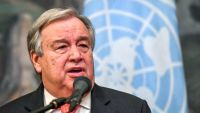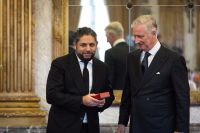Despite being couched in myths, immigration is firmly on the political agenda as the UK General Election approaches. It was therefore unsurprising to find it also on the programme for the Southbank Centre’s fifth annual Women of the World festival (WOW).
Five experts made up the WOW panel on immigration on Saturday 7th March: Diana Nammi, founder and Executive Director of the Iranian and Kurdish Women’s Rights Foundation, Ghada Rasheed of Women for Refugee Women, Ayah Omar from the Network of Eritrean Women, Sindy Czureja, representing the Roma Support Group, and Maria Patsalos, a lawyer with immigration expertise.
According to Ipsos MORI’s 2014 survey, Brits think that 24% of the population are immigrants; in reality, it is 13%. The WOW panel was clear that the gulf between perception and reality is down to media and political rhetoric, in particular, said Nammi, ‘Nigel Farage’s racist agenda’ and right-wing political aims. As a result of the media attention Farage receives, migrants become popular political scapegoats. This is not a new phenomenon, but it does tend to become especially heightened around election times.
Political scapegoats
Popular rhetoric around immigration creates a cycle of fear. ‘We’ are afraid of ‘them’, the people who take ‘our’ jobs and wrongly benefit from ‘our’ country, and because ‘we’ are the subjects of our narrative we do not consider or care what ‘they’ may be feeling. The UK’s Conservative-Lib Dem coalition government has promoted the myth about the burden migrants place on the NHS, ignoring the facts and erasing the strong history of migrant workers who were crucial in developing and continue to uphold the prized public service. The government has also introduced the Immigration Act 2014 which openly aims to create a ‘hostile environment’ for (illegal) migrants. Benefit tourism is a concept the government purports to take seriously despite it being yet another myth. At WOW, Nammi asked, ‘What would happen in this country if migrants all went on strike [or] stopped paying our taxes?’
We also find the Labour party overshooting the centre as they race to the right on immigration rhetoric. Ian Warren conducted research for the Fabian Society last year which found that support for Labour has dropped among ‘blue-collar working groups,’ who, ‘when asked whether they are comfortable living in close proximity to people from different cultures and backgrounds…are more likely to say no.’ So Ed Milliband confirms that it is 'a reality' that migrant workers are 'driving down wages' and says that the concerns ‘people’ (by which he presumably means non-migrants) have about immigration are therefore not 'based on prejudice.' Instead of promoting grassroots organising which is inclusive of migrants, Labour has bought into the scapegoating.
For political leaders to claim that myths about migrants are fair is to justify racism and xenophobia. ‘Scary, xenophobic rhetoric,’ says Patsolos, is the norm at this time ‘all because the political parties believe that we, the electorate, care’ – that immigration rhetoric wins and loses votes. Nammi agrees: the mainstream parties are competing to see who can appear hardest against migrants, and as a result blame migrants for other things the electorate cares about, like the economic crisis. This is neither true nor fair. And far more is at stake than an election: every member of the panel was clear that people’s lives, society as a whole, are affected.
The culture being created around immigration is ‘very dangerous’, ‘really scary’, says Patsolos; ‘disgusting’ agree Nammi and Omar; Czureja describes her own experience of hiding her ethnicity at school, not long ago, because she’d seen what happens to those who were found out; ‘they bully you, they beat you up.’ She explained that, despite Poland being part of the EU and therefore having obviously legal immigration status, there is ‘constant fear’ in Polish and Roma communities she works in.
At conferences she attends, Nammi said, ‘people from the Home Office come up to me and say, “go back to your country.”’ Home Office employees are public servants, and Nammi’s experience is further proof that the embarrassing ‘go home’ van campaign is part of a systematic ploy to fracture communities, not an isolated pilot. ‘We can’t pretend the Home Office is not political,’ said Patsolos. ‘It’s political at all times, especially at an election.’ If political rhetoric demands a tough stance on migrants, the Home Office delivers.
The Immigration Act 2014 is case in point. It requires hospitals and private landlords to carry out checks on suspected migrants. Landlords will be fined up to £3,000 if they do not comply with thorough background checks for suspected illegal migrants – which, of course, means background checks on any suspected migrant. Shami Chakrabarti, the director of Liberty, predicted that this will lead to a ‘race relations nightmare’ as private landlords and hospitals start to ‘err on the side of caution’ to avoid fines. Patsalos explains, ‘landlords have no [specialist legal] experience…they are going to look at someone’s face, name, colour.’
‘Human beings, not case studies’
It is extremely difficult for migrants - particularly female migrants - to have their voices heard. The current political environment deliberately delineates space for 'us' and 'them', and boldly scrawls racist slogans on the margins of the circular comfort zone in which the immigration 'debate' operates. Furthermore, this culture compounds the trauma already experienced by many migrants - the upheaval of leaving one country and settling in another, not to mention the experiences which caused or contributed to their reasons for leaving their 'home' country in the first place.
Omar told WOW about her own family’s experiences as Eritrean refugees. Women comprised one third of the liberation struggle in Eritrea, which prioritised equality, but after independence ‘it all changed.’ ‘It’s horrific, what’s happening to people,’ she told us, recounting her family’s experience of having traffickers phoning them and forcing them to listen to a child being tortured, demanding a £10,000 ransom for the child’s life – the ransom was paid, and the child died.
Omar works with the Network of Eritrean Women to help refugees access healthcare and support to deal with trauma, among other things. The panel agreed that there is not enough understanding of women in the immigration system. Rasheed’s own experience was that it is impossible to claim asylum on the grounds of your gender, and many female refugees, without the resources or expertise to navigate the Home Office’s application system, find that their applications fail because they do not tell the authorities what they ‘need’ to hear. ‘It is hard to tell a male officer about sexual violence,’ said Omar, and just because a woman is not looking you in the eye does not mean she is lying.
Earlier this month, Eiri Ohtani covered for openDemocracy 50.50 the publication of the Parliamentary detention inquiry’s report. She wrote about the significance of people’s voices, particularly the ‘experts-by-experience’, being heard. This was not an easy process. At the WOW panel event, Rasheed spoke about building trust with women in detention. These women are ‘exhausted, tired of telling their stories over and over’ for it to get their immigration status nowhere due to a ‘culture of denial and disbelief at the Home Office.’ Expecting women to share experiences of emotional and physical trauma can be another way of objectifying them, attempting to slot their stories into pre-existing narratives and Home Office bureaucracy. ‘They are not case studies, they are human beings,’ reminds Rasheed.
How, then, do we reclaim the immigration narrative, particularly with a UK General Election looming and a race to the bottom when it comes to popular political discourse? When 'immigration' is the subject, 'immigrants' become the Other, a silenced 'them' about whom lazy tropes are sketched; to combat this, migrants need to be positioned as 'us', the subject of the narrative.
Reclaiming the narrative
If mainstream political discourse, and the press which both panders to and shapes it, continues to promote the harmful immigration narrative, then truly democratic alternatives must give migrants more opportunities to speak. This means creating a listening space, a safe and receptive space for migrant voices, as is the case with the People on the Move dialogue on 50.50.
All feminists groups should ensure that migrant voices are platformed. We need to insist that our movement is inclusive regardless of whether or not we hold passports, what colour they are, and what our immigration papers say or don't say. When the Home Office says appalling things about migrant women, it hurts all women's rights; the discourse is damaging, and to think it does not seep into and erode us all is naïve at best.
When we ask our parliamentary candidates whether their policies are good for women, we must ask whether they are good for all women. Touting otherwise progressive feminist policies but refusing to take a progressive stance for migrant women won't do, and candidates should be called out on this.
The Immigration panel at WOW was easily the best I attended, and it was also the most diverse. The women on the panel knew whereof they spoke; real examples from their own lives and the women with whom they work made for honest and powerful discussions. 'Nothing about us without us' is a fundamental principle which needs to be prioritised as we approach the election. Otherwise, championing of migrants' rights can easily slide into the ground occupied by racism's well-meaning neighbour: paternalism.
We also need to create and enshrine space, beyond the electoral battlefield and Home Office check boxes and rubber stamps, where migrant voices are safe to speak out. Women for Refugee Women has modelled the creation of such space through, for example, the Home Sweet Home photography exhibition, as well as poetry and other creative campaigning. The WOW festival this year included three performances by the Baulkam Hill’s African Ladies Troupe. Four migrants to Australia told overwhelming stories in a powerful and moving production which reminded the audience that the women at its core inhabit still unfinished stories far bigger and more powerful than the episodes we expect to define them. In reality, theirs are strong stories of hope and fellow humanity, and they are stories we are privileged to hear.
Source: Opendemocracy
![]()





